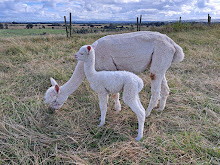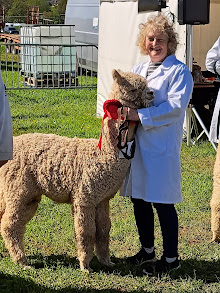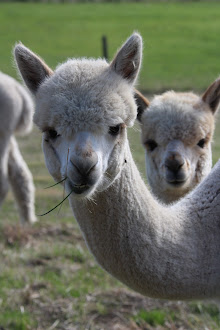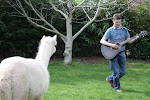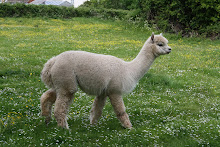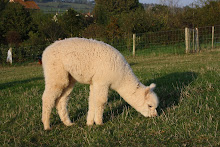 |
| Popham Augustus of Apple Vale, our stud male |
One of the most common questions people ask me about alpacas is, 'are they easy to look after?'. To which I reply that the basic requirements are similar to most livestock or even dogs and cats, but like all animals they have some unique characteristics. The similarities are, that feeding is straight-forward, you need to look at them at least twice a day, so that you learn what is normal behaviour and can spot when something isn't right, and they need water and free access to shelter from hot sun and cold rain. What also has to be borne in mind, is that in the longer term, paddocks, fences, gates and shelters will need maintenance, and that is arguably where there is as much commitment required as you give your animals.
 |
| The vibrant green patches of grass, are the latrines, which can amount to a large area, and the alpacas won't eat unless desperate |
Spring is the time when there is a little less animal contact required, with the exception of halter-training the weanlings, as shearing, birthing and mating is usually a couple of months away, but the paddocks will usually be at their worst, with growth having stopped over winter, and excess rainfall will have contributed to the paddocks getting easily churned up. If you are stocked up to the maximum number of animals for your acreage, you need to work hard to keep it in good condition.
 |
| Apple Vale Marianne |
One of the difficulties will be, that you can't improve all of the paddocks at the same time, because of your animals, and as the weather every year is slightly different, you can't have a rigid plan but just have to react to the circumstances. So what have we been doing?
In early March, once the ground surface had dried, I dragged the chain harrow around a couple of paddocks, and then towed a 'spiker' over them to open up our clayey soil.
 |
| Fertilizer spreading with the 'shopping trolley' |
Then we put some fertilizer down using the trusty 'shopping trolley', which doesn't take as long as you might think. We found that there have been shortages of fertilizer, and also our usual 20:10:10 mix is no longer available in 25kg bags.
I extended the canopy for one of the field shelters to make sure all of the females could get cover from rain and sun.
 |
| Joy mows an outbreak of buttercups |
Then recently, we noticed considerable amounts of Buttercup in some areas, so we either spot-sprayed or mowed them to reduce the number of seeds likely.
 |
| Apple Vale Liberty (Libby) |
Like most places, we had an exceptionally dry period, with just 3 days of light showers in a 46-day period from mid-March to the end of April, and the grass growth was virtually non-existant.
Once we could see some extended rainfall, we scattered some grass see over bare areas.
 |
| This bucket can easily be kicked off and spilt |
Since we began breeding alpacas 13 years ago, we have provided drinking water in buckets set on an up-turned bucket or plant pot, and tied to the wire mesh - the flaw with this, is that in hot weather, one of the alpacas will try to get their feet in the bucket, and knock it off the 'plinth' - for years I have tried to think of a suitable simple stand that I could make...and then last autumn I had a eureka moment....
I buy three buckets, cut a square piece of 12mm or 18mm plywood to fit under the bucket, then screw two of the buckets to the plywood, base to base and remove the handles....'doesn't the bucket leak with screws through the base?', I hear you ask...yes it would, but you take your third bucket and set it inside the upper bucket, the base can't be kicked away, and the bucket doesn't fall off! Now, as a structural engineer I have assisted architects in designing many fine buildings including hospitals, schools and houses, but this may be one of my most satisfying creations! :-)
 | ||
| Marianne poses beside a bucket set inside another bucket which is screwed to an up-turned bucket. |
 |
| Apple Vale Emily |
Meanwhile, these characters have joined us, meet Bob and Penny:
Finally, Fiesta loves to inspect the paddock hoovering:





